UGB361: Developing the Reflexive Practitioner - HRM and Self-Awareness
VerifiedAdded on 2023/06/10
|12
|3805
|297
Report
AI Summary
This report provides a qualitative investigation into the importance of self-awareness in Human Resource Management (HRM) for personal and professional development. It defines self-awareness, highlights its importance in identifying skill gaps and improving performance, and discusses its relevance to the professional identity of an HRM practitioner. The report outlines future aspirations for HRM, including maintaining employee morale, enhancing capabilities, and fostering teamwork. It identifies core and specialist knowledge areas, such as recruitment, problem-solving, and leadership, along with essential core behaviors like transparency, solution-orientation, and technology proficiency. The literature review touches upon critical incidents and experiential approaches, particularly Kolb's experiential learning cycle. The research design employs a qualitative approach, utilizing Interpretivism, an inductive approach, a mono method, and a case study strategy with a cross-sectional time horizon, relying on secondary data. Reflexivity is used as the research methodology, with cycles of reflection based on Gibbs' model. The report concludes by addressing challenges encountered when using qualitative data, reflexivity, and cycles of reflection.
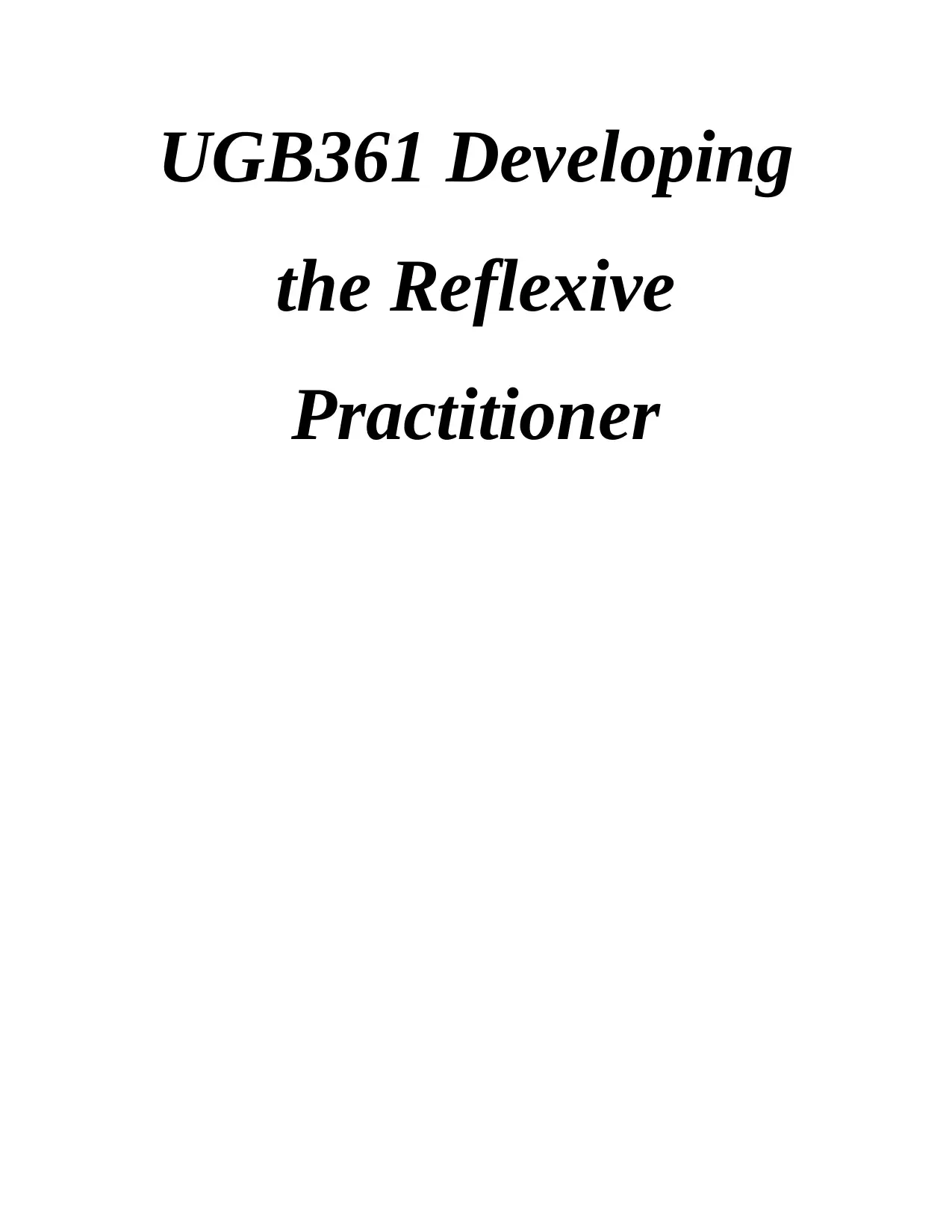
UGB361 Developing
the Reflexive
Practitioner
the Reflexive
Practitioner
Paraphrase This Document
Need a fresh take? Get an instant paraphrase of this document with our AI Paraphraser
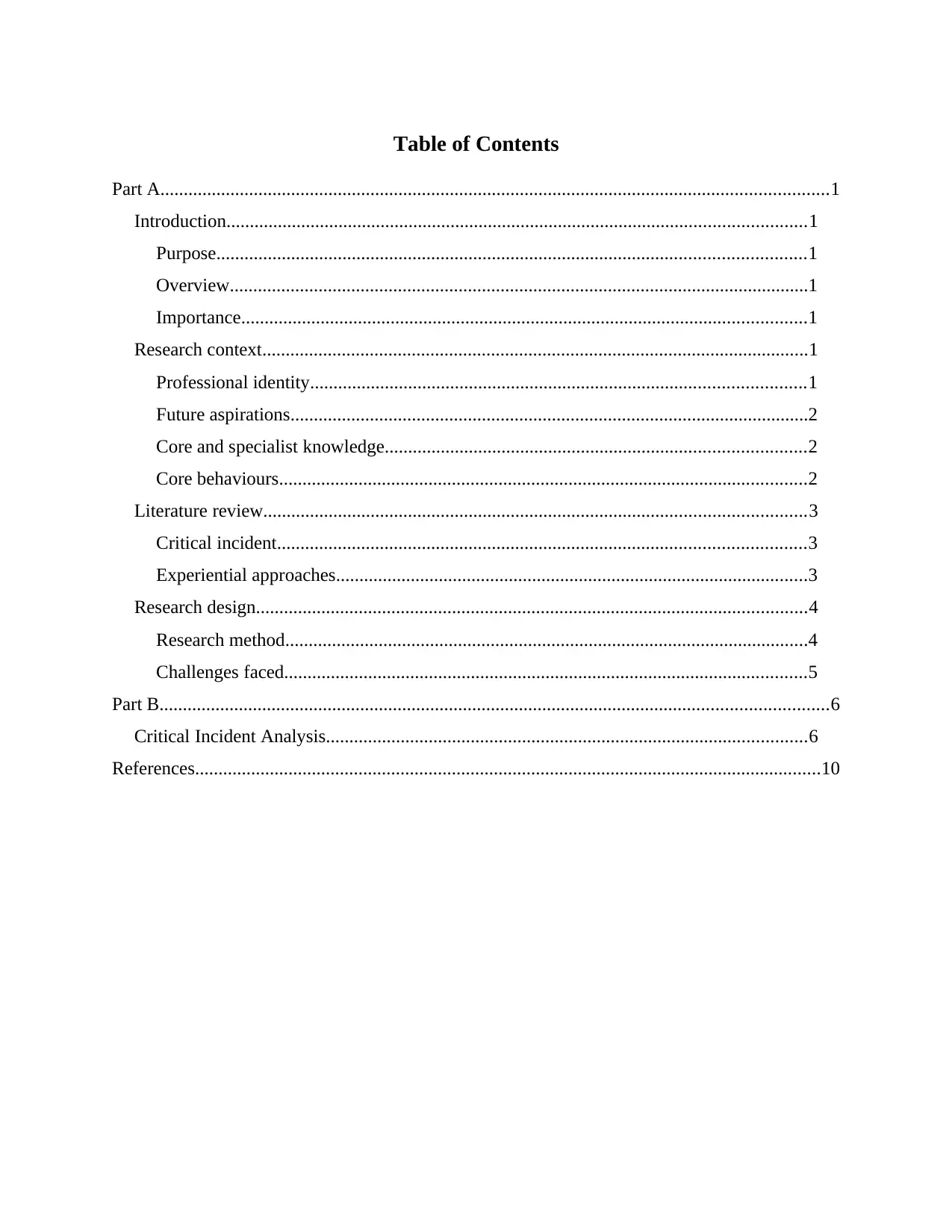
Table of Contents
Part A...............................................................................................................................................1
Introduction............................................................................................................................1
Purpose..............................................................................................................................1
Overview............................................................................................................................1
Importance.........................................................................................................................1
Research context.....................................................................................................................1
Professional identity..........................................................................................................1
Future aspirations...............................................................................................................2
Core and specialist knowledge..........................................................................................2
Core behaviours.................................................................................................................2
Literature review....................................................................................................................3
Critical incident.................................................................................................................3
Experiential approaches.....................................................................................................3
Research design......................................................................................................................4
Research method................................................................................................................4
Challenges faced................................................................................................................5
Part B...............................................................................................................................................6
Critical Incident Analysis.......................................................................................................6
References......................................................................................................................................10
Part A...............................................................................................................................................1
Introduction............................................................................................................................1
Purpose..............................................................................................................................1
Overview............................................................................................................................1
Importance.........................................................................................................................1
Research context.....................................................................................................................1
Professional identity..........................................................................................................1
Future aspirations...............................................................................................................2
Core and specialist knowledge..........................................................................................2
Core behaviours.................................................................................................................2
Literature review....................................................................................................................3
Critical incident.................................................................................................................3
Experiential approaches.....................................................................................................3
Research design......................................................................................................................4
Research method................................................................................................................4
Challenges faced................................................................................................................5
Part B...............................................................................................................................................6
Critical Incident Analysis.......................................................................................................6
References......................................................................................................................................10
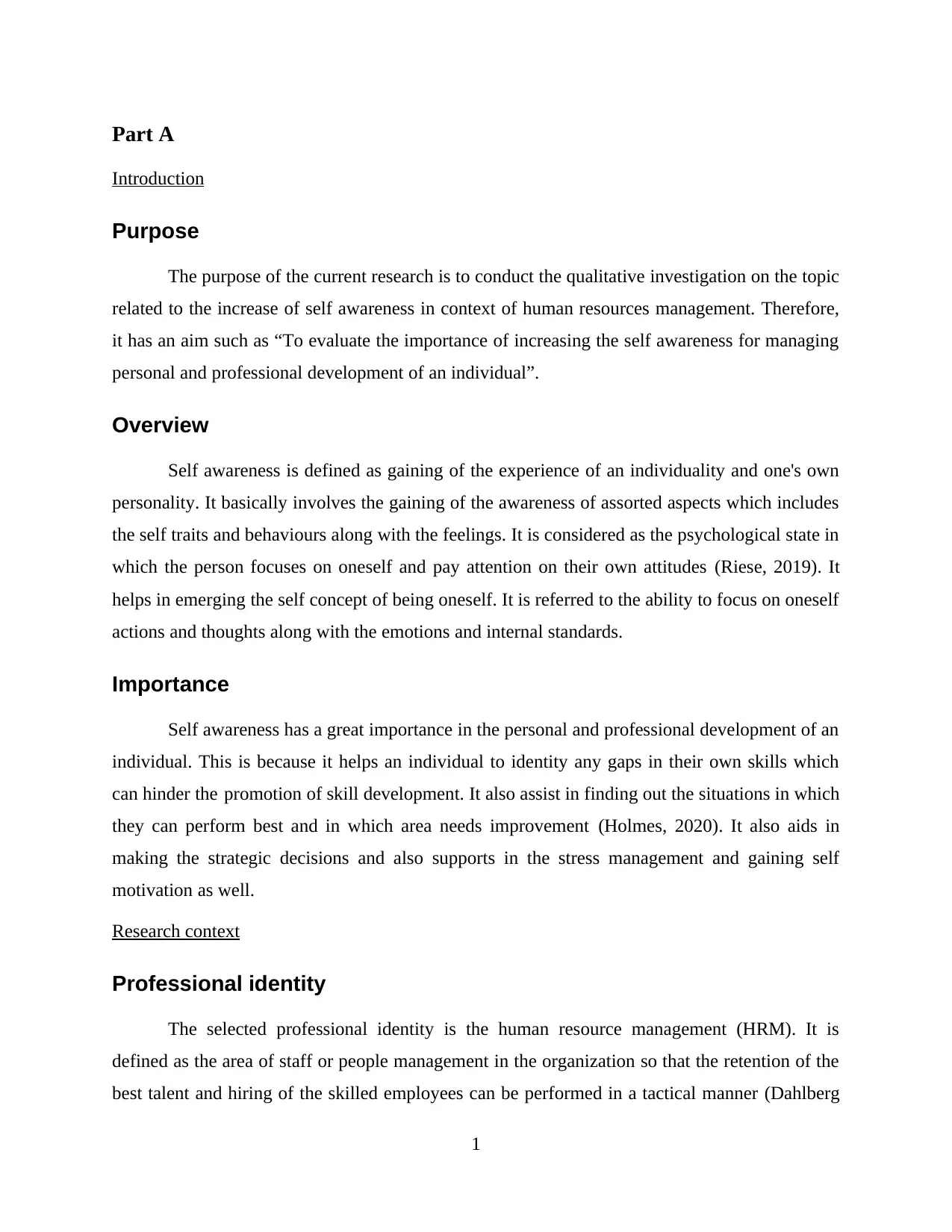
Part A
Introduction
Purpose
The purpose of the current research is to conduct the qualitative investigation on the topic
related to the increase of self awareness in context of human resources management. Therefore,
it has an aim such as “To evaluate the importance of increasing the self awareness for managing
personal and professional development of an individual”.
Overview
Self awareness is defined as gaining of the experience of an individuality and one's own
personality. It basically involves the gaining of the awareness of assorted aspects which includes
the self traits and behaviours along with the feelings. It is considered as the psychological state in
which the person focuses on oneself and pay attention on their own attitudes (Riese, 2019). It
helps in emerging the self concept of being oneself. It is referred to the ability to focus on oneself
actions and thoughts along with the emotions and internal standards.
Importance
Self awareness has a great importance in the personal and professional development of an
individual. This is because it helps an individual to identity any gaps in their own skills which
can hinder the promotion of skill development. It also assist in finding out the situations in which
they can perform best and in which area needs improvement (Holmes, 2020). It also aids in
making the strategic decisions and also supports in the stress management and gaining self
motivation as well.
Research context
Professional identity
The selected professional identity is the human resource management (HRM). It is
defined as the area of staff or people management in the organization so that the retention of the
best talent and hiring of the skilled employees can be performed in a tactical manner (Dahlberg
1
Introduction
Purpose
The purpose of the current research is to conduct the qualitative investigation on the topic
related to the increase of self awareness in context of human resources management. Therefore,
it has an aim such as “To evaluate the importance of increasing the self awareness for managing
personal and professional development of an individual”.
Overview
Self awareness is defined as gaining of the experience of an individuality and one's own
personality. It basically involves the gaining of the awareness of assorted aspects which includes
the self traits and behaviours along with the feelings. It is considered as the psychological state in
which the person focuses on oneself and pay attention on their own attitudes (Riese, 2019). It
helps in emerging the self concept of being oneself. It is referred to the ability to focus on oneself
actions and thoughts along with the emotions and internal standards.
Importance
Self awareness has a great importance in the personal and professional development of an
individual. This is because it helps an individual to identity any gaps in their own skills which
can hinder the promotion of skill development. It also assist in finding out the situations in which
they can perform best and in which area needs improvement (Holmes, 2020). It also aids in
making the strategic decisions and also supports in the stress management and gaining self
motivation as well.
Research context
Professional identity
The selected professional identity is the human resource management (HRM). It is
defined as the area of staff or people management in the organization so that the retention of the
best talent and hiring of the skilled employees can be performed in a tactical manner (Dahlberg
1
⊘ This is a preview!⊘
Do you want full access?
Subscribe today to unlock all pages.

Trusted by 1+ million students worldwide
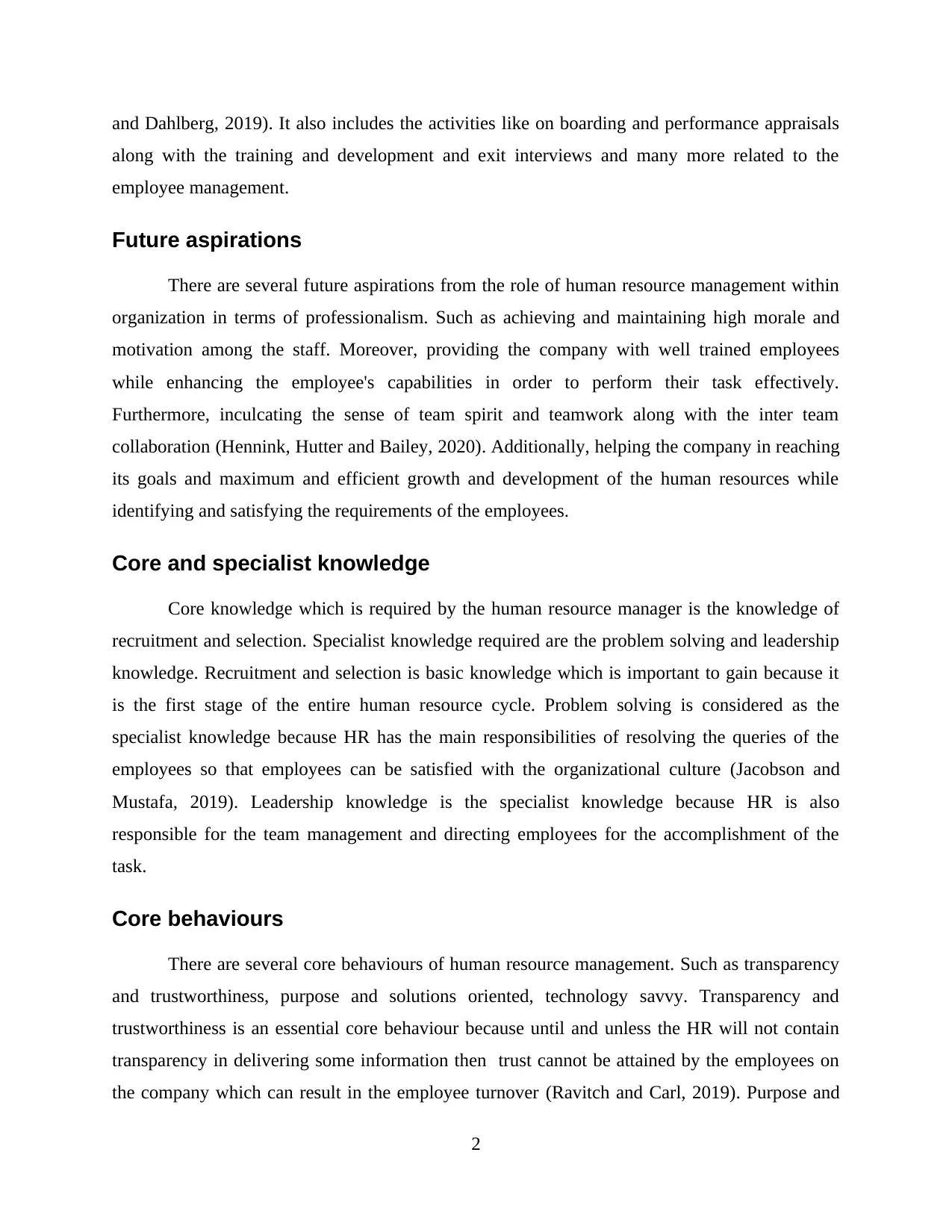
and Dahlberg, 2019). It also includes the activities like on boarding and performance appraisals
along with the training and development and exit interviews and many more related to the
employee management.
Future aspirations
There are several future aspirations from the role of human resource management within
organization in terms of professionalism. Such as achieving and maintaining high morale and
motivation among the staff. Moreover, providing the company with well trained employees
while enhancing the employee's capabilities in order to perform their task effectively.
Furthermore, inculcating the sense of team spirit and teamwork along with the inter team
collaboration (Hennink, Hutter and Bailey, 2020). Additionally, helping the company in reaching
its goals and maximum and efficient growth and development of the human resources while
identifying and satisfying the requirements of the employees.
Core and specialist knowledge
Core knowledge which is required by the human resource manager is the knowledge of
recruitment and selection. Specialist knowledge required are the problem solving and leadership
knowledge. Recruitment and selection is basic knowledge which is important to gain because it
is the first stage of the entire human resource cycle. Problem solving is considered as the
specialist knowledge because HR has the main responsibilities of resolving the queries of the
employees so that employees can be satisfied with the organizational culture (Jacobson and
Mustafa, 2019). Leadership knowledge is the specialist knowledge because HR is also
responsible for the team management and directing employees for the accomplishment of the
task.
Core behaviours
There are several core behaviours of human resource management. Such as transparency
and trustworthiness, purpose and solutions oriented, technology savvy. Transparency and
trustworthiness is an essential core behaviour because until and unless the HR will not contain
transparency in delivering some information then trust cannot be attained by the employees on
the company which can result in the employee turnover (Ravitch and Carl, 2019). Purpose and
2
along with the training and development and exit interviews and many more related to the
employee management.
Future aspirations
There are several future aspirations from the role of human resource management within
organization in terms of professionalism. Such as achieving and maintaining high morale and
motivation among the staff. Moreover, providing the company with well trained employees
while enhancing the employee's capabilities in order to perform their task effectively.
Furthermore, inculcating the sense of team spirit and teamwork along with the inter team
collaboration (Hennink, Hutter and Bailey, 2020). Additionally, helping the company in reaching
its goals and maximum and efficient growth and development of the human resources while
identifying and satisfying the requirements of the employees.
Core and specialist knowledge
Core knowledge which is required by the human resource manager is the knowledge of
recruitment and selection. Specialist knowledge required are the problem solving and leadership
knowledge. Recruitment and selection is basic knowledge which is important to gain because it
is the first stage of the entire human resource cycle. Problem solving is considered as the
specialist knowledge because HR has the main responsibilities of resolving the queries of the
employees so that employees can be satisfied with the organizational culture (Jacobson and
Mustafa, 2019). Leadership knowledge is the specialist knowledge because HR is also
responsible for the team management and directing employees for the accomplishment of the
task.
Core behaviours
There are several core behaviours of human resource management. Such as transparency
and trustworthiness, purpose and solutions oriented, technology savvy. Transparency and
trustworthiness is an essential core behaviour because until and unless the HR will not contain
transparency in delivering some information then trust cannot be attained by the employees on
the company which can result in the employee turnover (Ravitch and Carl, 2019). Purpose and
2
Paraphrase This Document
Need a fresh take? Get an instant paraphrase of this document with our AI Paraphraser
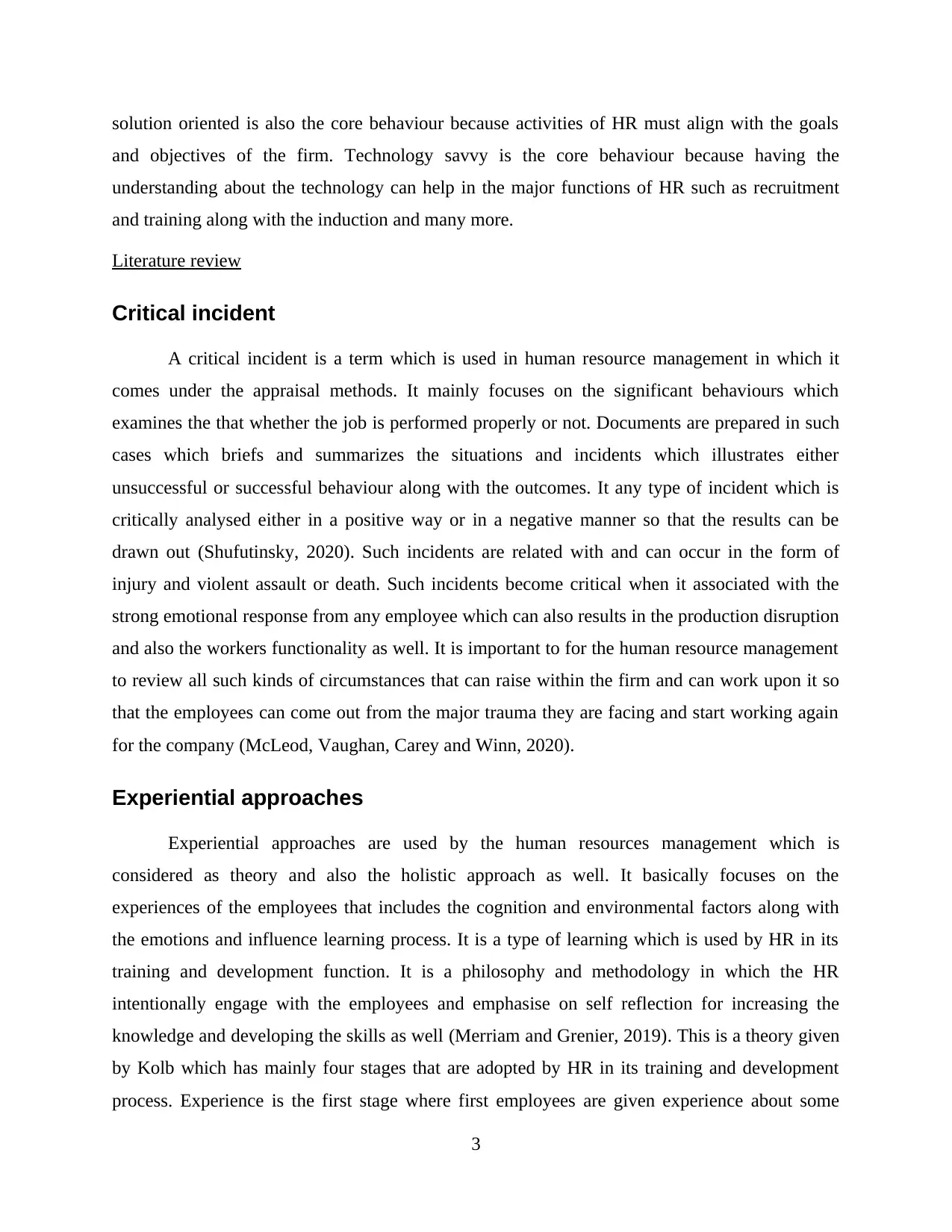
solution oriented is also the core behaviour because activities of HR must align with the goals
and objectives of the firm. Technology savvy is the core behaviour because having the
understanding about the technology can help in the major functions of HR such as recruitment
and training along with the induction and many more.
Literature review
Critical incident
A critical incident is a term which is used in human resource management in which it
comes under the appraisal methods. It mainly focuses on the significant behaviours which
examines the that whether the job is performed properly or not. Documents are prepared in such
cases which briefs and summarizes the situations and incidents which illustrates either
unsuccessful or successful behaviour along with the outcomes. It any type of incident which is
critically analysed either in a positive way or in a negative manner so that the results can be
drawn out (Shufutinsky, 2020). Such incidents are related with and can occur in the form of
injury and violent assault or death. Such incidents become critical when it associated with the
strong emotional response from any employee which can also results in the production disruption
and also the workers functionality as well. It is important to for the human resource management
to review all such kinds of circumstances that can raise within the firm and can work upon it so
that the employees can come out from the major trauma they are facing and start working again
for the company (McLeod, Vaughan, Carey and Winn, 2020).
Experiential approaches
Experiential approaches are used by the human resources management which is
considered as theory and also the holistic approach as well. It basically focuses on the
experiences of the employees that includes the cognition and environmental factors along with
the emotions and influence learning process. It is a type of learning which is used by HR in its
training and development function. It is a philosophy and methodology in which the HR
intentionally engage with the employees and emphasise on self reflection for increasing the
knowledge and developing the skills as well (Merriam and Grenier, 2019). This is a theory given
by Kolb which has mainly four stages that are adopted by HR in its training and development
process. Experience is the first stage where first employees are given experience about some
3
and objectives of the firm. Technology savvy is the core behaviour because having the
understanding about the technology can help in the major functions of HR such as recruitment
and training along with the induction and many more.
Literature review
Critical incident
A critical incident is a term which is used in human resource management in which it
comes under the appraisal methods. It mainly focuses on the significant behaviours which
examines the that whether the job is performed properly or not. Documents are prepared in such
cases which briefs and summarizes the situations and incidents which illustrates either
unsuccessful or successful behaviour along with the outcomes. It any type of incident which is
critically analysed either in a positive way or in a negative manner so that the results can be
drawn out (Shufutinsky, 2020). Such incidents are related with and can occur in the form of
injury and violent assault or death. Such incidents become critical when it associated with the
strong emotional response from any employee which can also results in the production disruption
and also the workers functionality as well. It is important to for the human resource management
to review all such kinds of circumstances that can raise within the firm and can work upon it so
that the employees can come out from the major trauma they are facing and start working again
for the company (McLeod, Vaughan, Carey and Winn, 2020).
Experiential approaches
Experiential approaches are used by the human resources management which is
considered as theory and also the holistic approach as well. It basically focuses on the
experiences of the employees that includes the cognition and environmental factors along with
the emotions and influence learning process. It is a type of learning which is used by HR in its
training and development function. It is a philosophy and methodology in which the HR
intentionally engage with the employees and emphasise on self reflection for increasing the
knowledge and developing the skills as well (Merriam and Grenier, 2019). This is a theory given
by Kolb which has mainly four stages that are adopted by HR in its training and development
process. Experience is the first stage where first employees are given experience about some
3
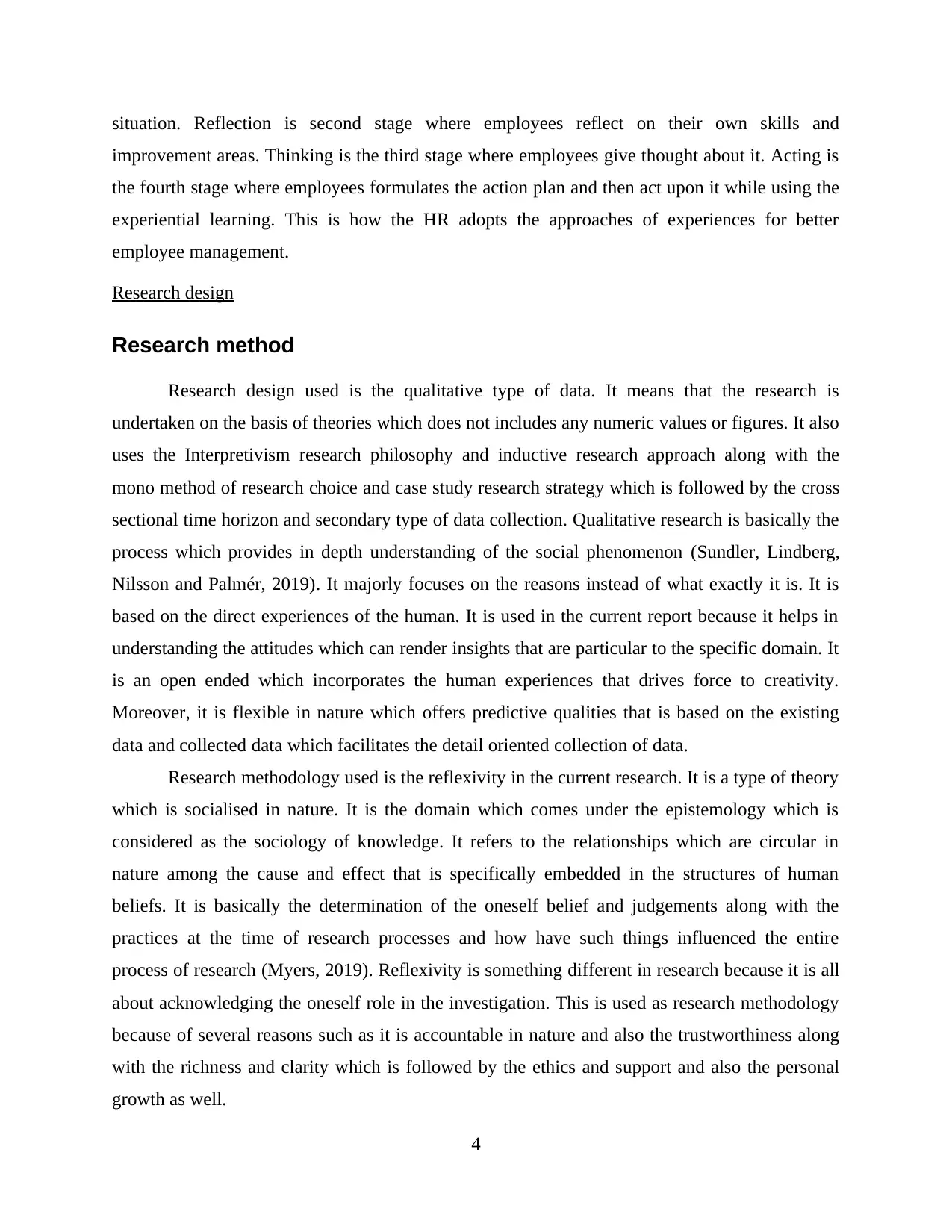
situation. Reflection is second stage where employees reflect on their own skills and
improvement areas. Thinking is the third stage where employees give thought about it. Acting is
the fourth stage where employees formulates the action plan and then act upon it while using the
experiential learning. This is how the HR adopts the approaches of experiences for better
employee management.
Research design
Research method
Research design used is the qualitative type of data. It means that the research is
undertaken on the basis of theories which does not includes any numeric values or figures. It also
uses the Interpretivism research philosophy and inductive research approach along with the
mono method of research choice and case study research strategy which is followed by the cross
sectional time horizon and secondary type of data collection. Qualitative research is basically the
process which provides in depth understanding of the social phenomenon (Sundler, Lindberg,
Nilsson and Palmér, 2019). It majorly focuses on the reasons instead of what exactly it is. It is
based on the direct experiences of the human. It is used in the current report because it helps in
understanding the attitudes which can render insights that are particular to the specific domain. It
is an open ended which incorporates the human experiences that drives force to creativity.
Moreover, it is flexible in nature which offers predictive qualities that is based on the existing
data and collected data which facilitates the detail oriented collection of data.
Research methodology used is the reflexivity in the current research. It is a type of theory
which is socialised in nature. It is the domain which comes under the epistemology which is
considered as the sociology of knowledge. It refers to the relationships which are circular in
nature among the cause and effect that is specifically embedded in the structures of human
beliefs. It is basically the determination of the oneself belief and judgements along with the
practices at the time of research processes and how have such things influenced the entire
process of research (Myers, 2019). Reflexivity is something different in research because it is all
about acknowledging the oneself role in the investigation. This is used as research methodology
because of several reasons such as it is accountable in nature and also the trustworthiness along
with the richness and clarity which is followed by the ethics and support and also the personal
growth as well.
4
improvement areas. Thinking is the third stage where employees give thought about it. Acting is
the fourth stage where employees formulates the action plan and then act upon it while using the
experiential learning. This is how the HR adopts the approaches of experiences for better
employee management.
Research design
Research method
Research design used is the qualitative type of data. It means that the research is
undertaken on the basis of theories which does not includes any numeric values or figures. It also
uses the Interpretivism research philosophy and inductive research approach along with the
mono method of research choice and case study research strategy which is followed by the cross
sectional time horizon and secondary type of data collection. Qualitative research is basically the
process which provides in depth understanding of the social phenomenon (Sundler, Lindberg,
Nilsson and Palmér, 2019). It majorly focuses on the reasons instead of what exactly it is. It is
based on the direct experiences of the human. It is used in the current report because it helps in
understanding the attitudes which can render insights that are particular to the specific domain. It
is an open ended which incorporates the human experiences that drives force to creativity.
Moreover, it is flexible in nature which offers predictive qualities that is based on the existing
data and collected data which facilitates the detail oriented collection of data.
Research methodology used is the reflexivity in the current research. It is a type of theory
which is socialised in nature. It is the domain which comes under the epistemology which is
considered as the sociology of knowledge. It refers to the relationships which are circular in
nature among the cause and effect that is specifically embedded in the structures of human
beliefs. It is basically the determination of the oneself belief and judgements along with the
practices at the time of research processes and how have such things influenced the entire
process of research (Myers, 2019). Reflexivity is something different in research because it is all
about acknowledging the oneself role in the investigation. This is used as research methodology
because of several reasons such as it is accountable in nature and also the trustworthiness along
with the richness and clarity which is followed by the ethics and support and also the personal
growth as well.
4
⊘ This is a preview!⊘
Do you want full access?
Subscribe today to unlock all pages.

Trusted by 1+ million students worldwide
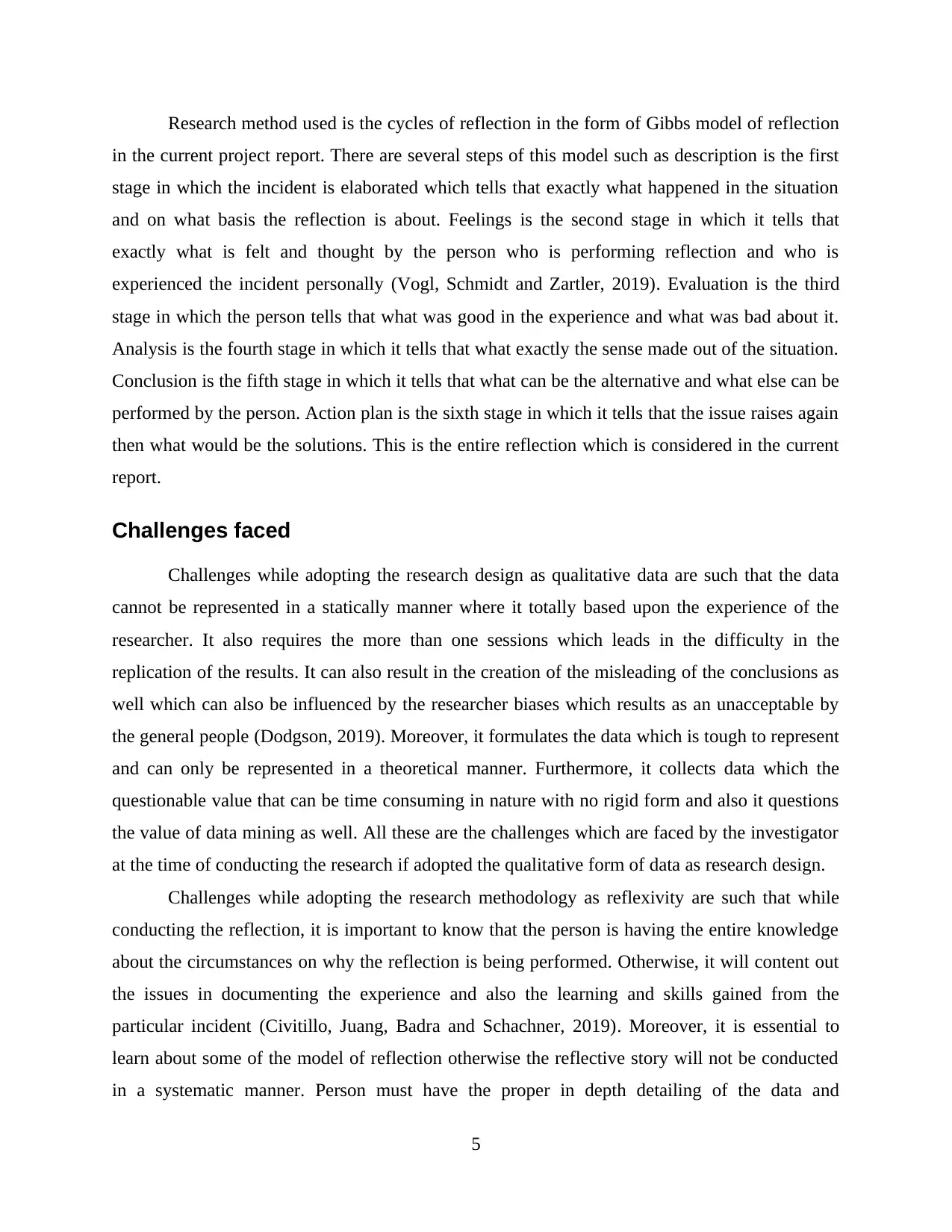
Research method used is the cycles of reflection in the form of Gibbs model of reflection
in the current project report. There are several steps of this model such as description is the first
stage in which the incident is elaborated which tells that exactly what happened in the situation
and on what basis the reflection is about. Feelings is the second stage in which it tells that
exactly what is felt and thought by the person who is performing reflection and who is
experienced the incident personally (Vogl, Schmidt and Zartler, 2019). Evaluation is the third
stage in which the person tells that what was good in the experience and what was bad about it.
Analysis is the fourth stage in which it tells that what exactly the sense made out of the situation.
Conclusion is the fifth stage in which it tells that what can be the alternative and what else can be
performed by the person. Action plan is the sixth stage in which it tells that the issue raises again
then what would be the solutions. This is the entire reflection which is considered in the current
report.
Challenges faced
Challenges while adopting the research design as qualitative data are such that the data
cannot be represented in a statically manner where it totally based upon the experience of the
researcher. It also requires the more than one sessions which leads in the difficulty in the
replication of the results. It can also result in the creation of the misleading of the conclusions as
well which can also be influenced by the researcher biases which results as an unacceptable by
the general people (Dodgson, 2019). Moreover, it formulates the data which is tough to represent
and can only be represented in a theoretical manner. Furthermore, it collects data which the
questionable value that can be time consuming in nature with no rigid form and also it questions
the value of data mining as well. All these are the challenges which are faced by the investigator
at the time of conducting the research if adopted the qualitative form of data as research design.
Challenges while adopting the research methodology as reflexivity are such that while
conducting the reflection, it is important to know that the person is having the entire knowledge
about the circumstances on why the reflection is being performed. Otherwise, it will content out
the issues in documenting the experience and also the learning and skills gained from the
particular incident (Civitillo, Juang, Badra and Schachner, 2019). Moreover, it is essential to
learn about some of the model of reflection otherwise the reflective story will not be conducted
in a systematic manner. Person must have the proper in depth detailing of the data and
5
in the current project report. There are several steps of this model such as description is the first
stage in which the incident is elaborated which tells that exactly what happened in the situation
and on what basis the reflection is about. Feelings is the second stage in which it tells that
exactly what is felt and thought by the person who is performing reflection and who is
experienced the incident personally (Vogl, Schmidt and Zartler, 2019). Evaluation is the third
stage in which the person tells that what was good in the experience and what was bad about it.
Analysis is the fourth stage in which it tells that what exactly the sense made out of the situation.
Conclusion is the fifth stage in which it tells that what can be the alternative and what else can be
performed by the person. Action plan is the sixth stage in which it tells that the issue raises again
then what would be the solutions. This is the entire reflection which is considered in the current
report.
Challenges faced
Challenges while adopting the research design as qualitative data are such that the data
cannot be represented in a statically manner where it totally based upon the experience of the
researcher. It also requires the more than one sessions which leads in the difficulty in the
replication of the results. It can also result in the creation of the misleading of the conclusions as
well which can also be influenced by the researcher biases which results as an unacceptable by
the general people (Dodgson, 2019). Moreover, it formulates the data which is tough to represent
and can only be represented in a theoretical manner. Furthermore, it collects data which the
questionable value that can be time consuming in nature with no rigid form and also it questions
the value of data mining as well. All these are the challenges which are faced by the investigator
at the time of conducting the research if adopted the qualitative form of data as research design.
Challenges while adopting the research methodology as reflexivity are such that while
conducting the reflection, it is important to know that the person is having the entire knowledge
about the circumstances on why the reflection is being performed. Otherwise, it will content out
the issues in documenting the experience and also the learning and skills gained from the
particular incident (Civitillo, Juang, Badra and Schachner, 2019). Moreover, it is essential to
learn about some of the model of reflection otherwise the reflective story will not be conducted
in a systematic manner. Person must have the proper in depth detailing of the data and
5
Paraphrase This Document
Need a fresh take? Get an instant paraphrase of this document with our AI Paraphraser
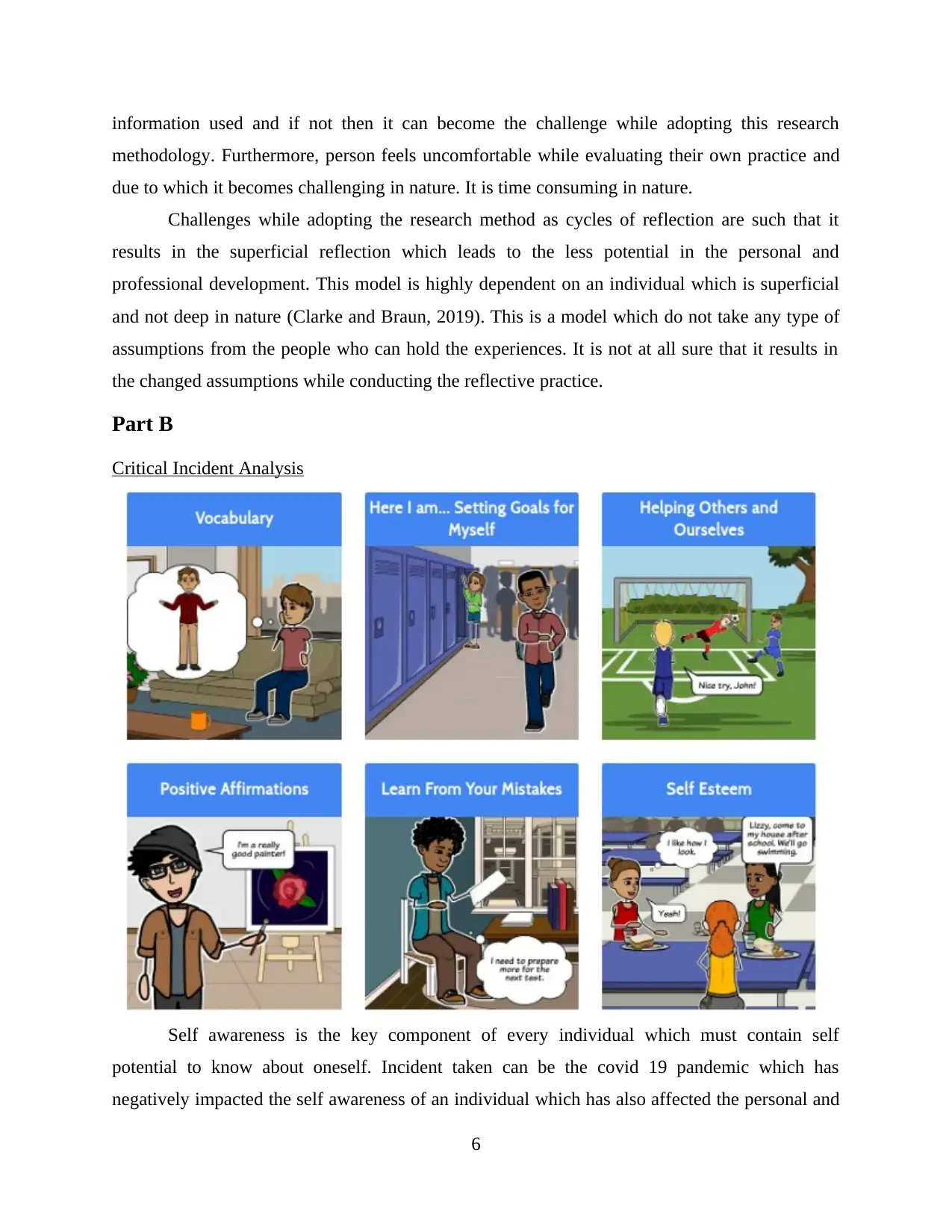
information used and if not then it can become the challenge while adopting this research
methodology. Furthermore, person feels uncomfortable while evaluating their own practice and
due to which it becomes challenging in nature. It is time consuming in nature.
Challenges while adopting the research method as cycles of reflection are such that it
results in the superficial reflection which leads to the less potential in the personal and
professional development. This model is highly dependent on an individual which is superficial
and not deep in nature (Clarke and Braun, 2019). This is a model which do not take any type of
assumptions from the people who can hold the experiences. It is not at all sure that it results in
the changed assumptions while conducting the reflective practice.
Part B
Critical Incident Analysis
Self awareness is the key component of every individual which must contain self
potential to know about oneself. Incident taken can be the covid 19 pandemic which has
negatively impacted the self awareness of an individual which has also affected the personal and
6
methodology. Furthermore, person feels uncomfortable while evaluating their own practice and
due to which it becomes challenging in nature. It is time consuming in nature.
Challenges while adopting the research method as cycles of reflection are such that it
results in the superficial reflection which leads to the less potential in the personal and
professional development. This model is highly dependent on an individual which is superficial
and not deep in nature (Clarke and Braun, 2019). This is a model which do not take any type of
assumptions from the people who can hold the experiences. It is not at all sure that it results in
the changed assumptions while conducting the reflective practice.
Part B
Critical Incident Analysis
Self awareness is the key component of every individual which must contain self
potential to know about oneself. Incident taken can be the covid 19 pandemic which has
negatively impacted the self awareness of an individual which has also affected the personal and
6
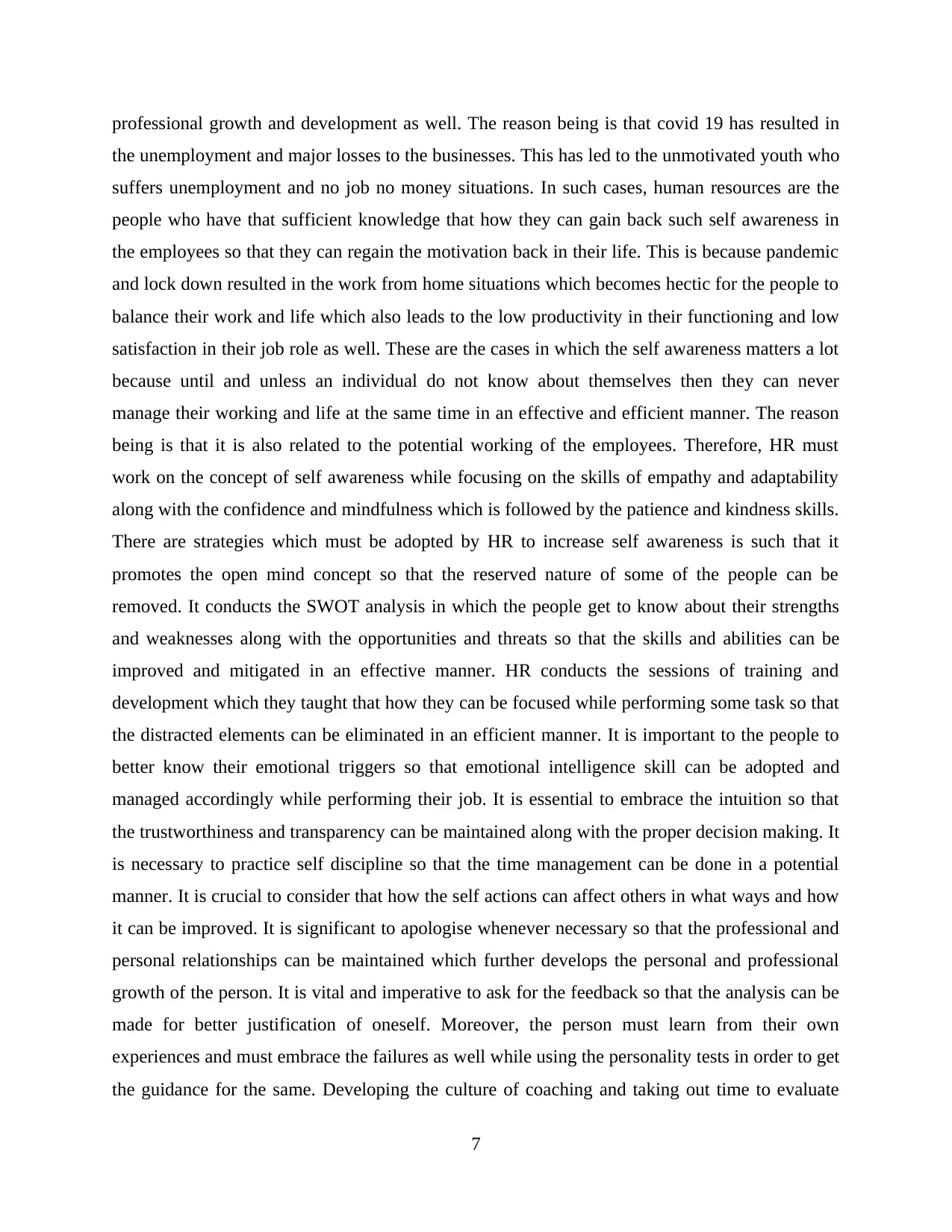
professional growth and development as well. The reason being is that covid 19 has resulted in
the unemployment and major losses to the businesses. This has led to the unmotivated youth who
suffers unemployment and no job no money situations. In such cases, human resources are the
people who have that sufficient knowledge that how they can gain back such self awareness in
the employees so that they can regain the motivation back in their life. This is because pandemic
and lock down resulted in the work from home situations which becomes hectic for the people to
balance their work and life which also leads to the low productivity in their functioning and low
satisfaction in their job role as well. These are the cases in which the self awareness matters a lot
because until and unless an individual do not know about themselves then they can never
manage their working and life at the same time in an effective and efficient manner. The reason
being is that it is also related to the potential working of the employees. Therefore, HR must
work on the concept of self awareness while focusing on the skills of empathy and adaptability
along with the confidence and mindfulness which is followed by the patience and kindness skills.
There are strategies which must be adopted by HR to increase self awareness is such that it
promotes the open mind concept so that the reserved nature of some of the people can be
removed. It conducts the SWOT analysis in which the people get to know about their strengths
and weaknesses along with the opportunities and threats so that the skills and abilities can be
improved and mitigated in an effective manner. HR conducts the sessions of training and
development which they taught that how they can be focused while performing some task so that
the distracted elements can be eliminated in an efficient manner. It is important to the people to
better know their emotional triggers so that emotional intelligence skill can be adopted and
managed accordingly while performing their job. It is essential to embrace the intuition so that
the trustworthiness and transparency can be maintained along with the proper decision making. It
is necessary to practice self discipline so that the time management can be done in a potential
manner. It is crucial to consider that how the self actions can affect others in what ways and how
it can be improved. It is significant to apologise whenever necessary so that the professional and
personal relationships can be maintained which further develops the personal and professional
growth of the person. It is vital and imperative to ask for the feedback so that the analysis can be
made for better justification of oneself. Moreover, the person must learn from their own
experiences and must embrace the failures as well while using the personality tests in order to get
the guidance for the same. Developing the culture of coaching and taking out time to evaluate
7
the unemployment and major losses to the businesses. This has led to the unmotivated youth who
suffers unemployment and no job no money situations. In such cases, human resources are the
people who have that sufficient knowledge that how they can gain back such self awareness in
the employees so that they can regain the motivation back in their life. This is because pandemic
and lock down resulted in the work from home situations which becomes hectic for the people to
balance their work and life which also leads to the low productivity in their functioning and low
satisfaction in their job role as well. These are the cases in which the self awareness matters a lot
because until and unless an individual do not know about themselves then they can never
manage their working and life at the same time in an effective and efficient manner. The reason
being is that it is also related to the potential working of the employees. Therefore, HR must
work on the concept of self awareness while focusing on the skills of empathy and adaptability
along with the confidence and mindfulness which is followed by the patience and kindness skills.
There are strategies which must be adopted by HR to increase self awareness is such that it
promotes the open mind concept so that the reserved nature of some of the people can be
removed. It conducts the SWOT analysis in which the people get to know about their strengths
and weaknesses along with the opportunities and threats so that the skills and abilities can be
improved and mitigated in an effective manner. HR conducts the sessions of training and
development which they taught that how they can be focused while performing some task so that
the distracted elements can be eliminated in an efficient manner. It is important to the people to
better know their emotional triggers so that emotional intelligence skill can be adopted and
managed accordingly while performing their job. It is essential to embrace the intuition so that
the trustworthiness and transparency can be maintained along with the proper decision making. It
is necessary to practice self discipline so that the time management can be done in a potential
manner. It is crucial to consider that how the self actions can affect others in what ways and how
it can be improved. It is significant to apologise whenever necessary so that the professional and
personal relationships can be maintained which further develops the personal and professional
growth of the person. It is vital and imperative to ask for the feedback so that the analysis can be
made for better justification of oneself. Moreover, the person must learn from their own
experiences and must embrace the failures as well while using the personality tests in order to get
the guidance for the same. Developing the culture of coaching and taking out time to evaluate
7
⊘ This is a preview!⊘
Do you want full access?
Subscribe today to unlock all pages.

Trusted by 1+ million students worldwide
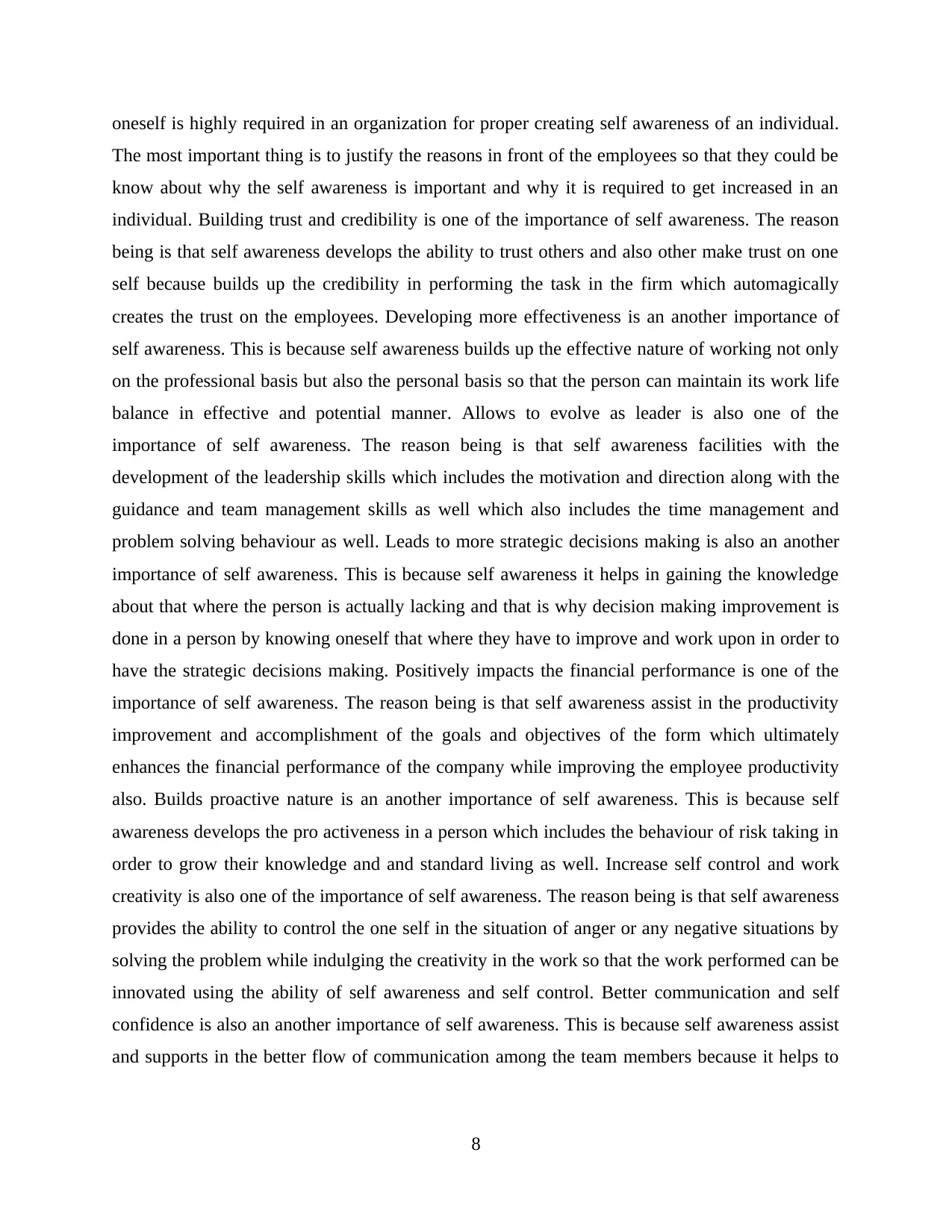
oneself is highly required in an organization for proper creating self awareness of an individual.
The most important thing is to justify the reasons in front of the employees so that they could be
know about why the self awareness is important and why it is required to get increased in an
individual. Building trust and credibility is one of the importance of self awareness. The reason
being is that self awareness develops the ability to trust others and also other make trust on one
self because builds up the credibility in performing the task in the firm which automagically
creates the trust on the employees. Developing more effectiveness is an another importance of
self awareness. This is because self awareness builds up the effective nature of working not only
on the professional basis but also the personal basis so that the person can maintain its work life
balance in effective and potential manner. Allows to evolve as leader is also one of the
importance of self awareness. The reason being is that self awareness facilities with the
development of the leadership skills which includes the motivation and direction along with the
guidance and team management skills as well which also includes the time management and
problem solving behaviour as well. Leads to more strategic decisions making is also an another
importance of self awareness. This is because self awareness it helps in gaining the knowledge
about that where the person is actually lacking and that is why decision making improvement is
done in a person by knowing oneself that where they have to improve and work upon in order to
have the strategic decisions making. Positively impacts the financial performance is one of the
importance of self awareness. The reason being is that self awareness assist in the productivity
improvement and accomplishment of the goals and objectives of the form which ultimately
enhances the financial performance of the company while improving the employee productivity
also. Builds proactive nature is an another importance of self awareness. This is because self
awareness develops the pro activeness in a person which includes the behaviour of risk taking in
order to grow their knowledge and and standard living as well. Increase self control and work
creativity is also one of the importance of self awareness. The reason being is that self awareness
provides the ability to control the one self in the situation of anger or any negative situations by
solving the problem while indulging the creativity in the work so that the work performed can be
innovated using the ability of self awareness and self control. Better communication and self
confidence is also an another importance of self awareness. This is because self awareness assist
and supports in the better flow of communication among the team members because it helps to
8
The most important thing is to justify the reasons in front of the employees so that they could be
know about why the self awareness is important and why it is required to get increased in an
individual. Building trust and credibility is one of the importance of self awareness. The reason
being is that self awareness develops the ability to trust others and also other make trust on one
self because builds up the credibility in performing the task in the firm which automagically
creates the trust on the employees. Developing more effectiveness is an another importance of
self awareness. This is because self awareness builds up the effective nature of working not only
on the professional basis but also the personal basis so that the person can maintain its work life
balance in effective and potential manner. Allows to evolve as leader is also one of the
importance of self awareness. The reason being is that self awareness facilities with the
development of the leadership skills which includes the motivation and direction along with the
guidance and team management skills as well which also includes the time management and
problem solving behaviour as well. Leads to more strategic decisions making is also an another
importance of self awareness. This is because self awareness it helps in gaining the knowledge
about that where the person is actually lacking and that is why decision making improvement is
done in a person by knowing oneself that where they have to improve and work upon in order to
have the strategic decisions making. Positively impacts the financial performance is one of the
importance of self awareness. The reason being is that self awareness assist in the productivity
improvement and accomplishment of the goals and objectives of the form which ultimately
enhances the financial performance of the company while improving the employee productivity
also. Builds proactive nature is an another importance of self awareness. This is because self
awareness develops the pro activeness in a person which includes the behaviour of risk taking in
order to grow their knowledge and and standard living as well. Increase self control and work
creativity is also one of the importance of self awareness. The reason being is that self awareness
provides the ability to control the one self in the situation of anger or any negative situations by
solving the problem while indulging the creativity in the work so that the work performed can be
innovated using the ability of self awareness and self control. Better communication and self
confidence is also an another importance of self awareness. This is because self awareness assist
and supports in the better flow of communication among the team members because it helps to
8
Paraphrase This Document
Need a fresh take? Get an instant paraphrase of this document with our AI Paraphraser
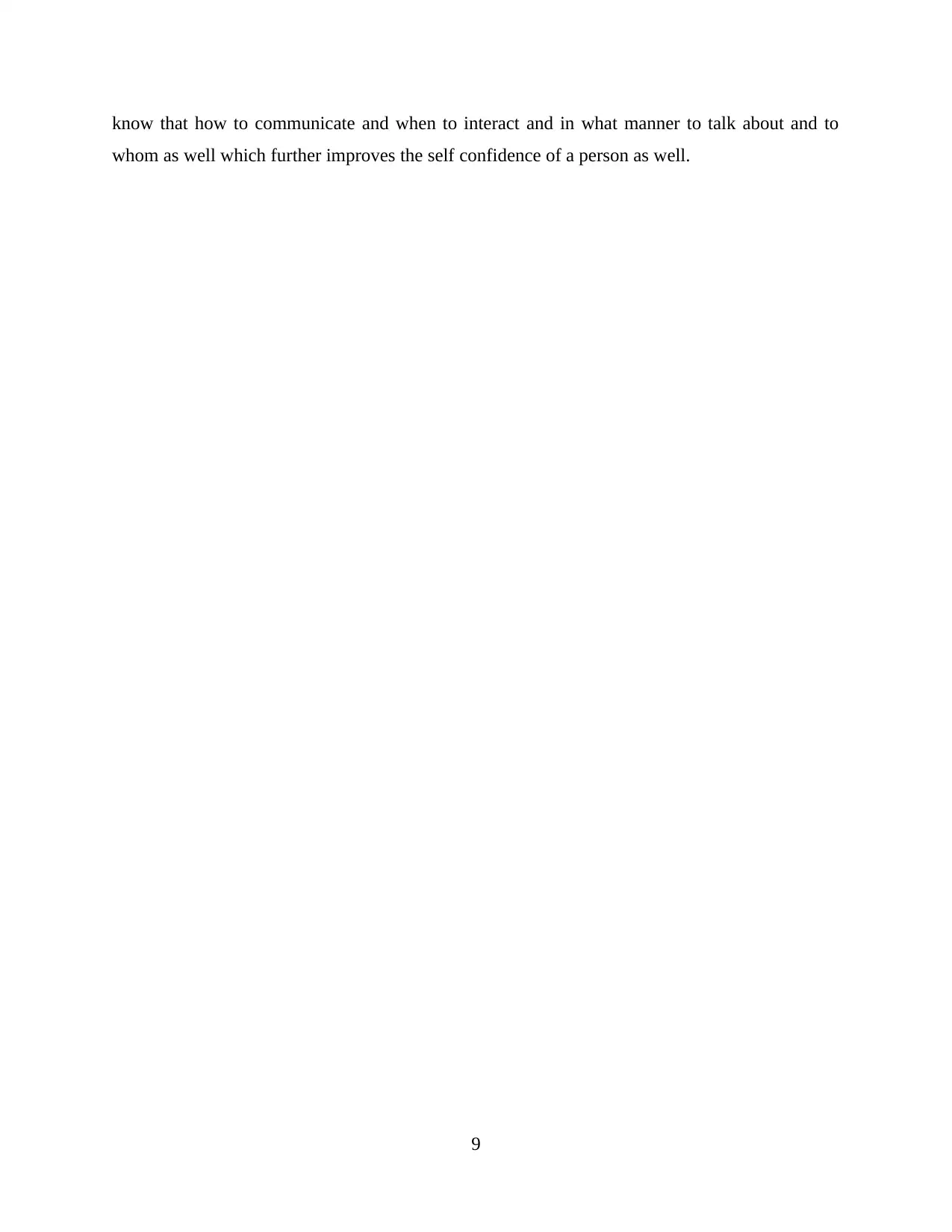
know that how to communicate and when to interact and in what manner to talk about and to
whom as well which further improves the self confidence of a person as well.
9
whom as well which further improves the self confidence of a person as well.
9
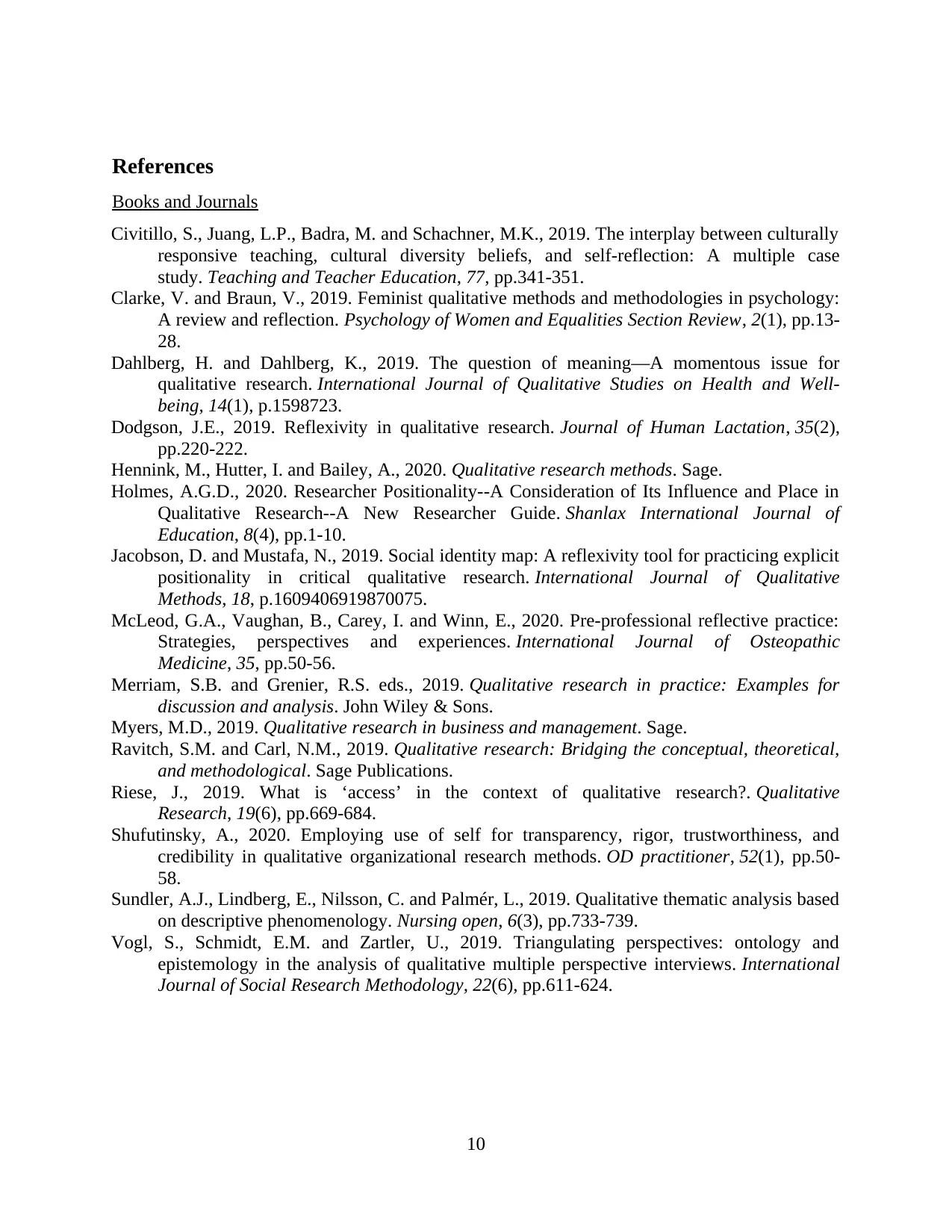
References
Books and Journals
Civitillo, S., Juang, L.P., Badra, M. and Schachner, M.K., 2019. The interplay between culturally
responsive teaching, cultural diversity beliefs, and self-reflection: A multiple case
study. Teaching and Teacher Education, 77, pp.341-351.
Clarke, V. and Braun, V., 2019. Feminist qualitative methods and methodologies in psychology:
A review and reflection. Psychology of Women and Equalities Section Review, 2(1), pp.13-
28.
Dahlberg, H. and Dahlberg, K., 2019. The question of meaning—A momentous issue for
qualitative research. International Journal of Qualitative Studies on Health and Well-
being, 14(1), p.1598723.
Dodgson, J.E., 2019. Reflexivity in qualitative research. Journal of Human Lactation, 35(2),
pp.220-222.
Hennink, M., Hutter, I. and Bailey, A., 2020. Qualitative research methods. Sage.
Holmes, A.G.D., 2020. Researcher Positionality--A Consideration of Its Influence and Place in
Qualitative Research--A New Researcher Guide. Shanlax International Journal of
Education, 8(4), pp.1-10.
Jacobson, D. and Mustafa, N., 2019. Social identity map: A reflexivity tool for practicing explicit
positionality in critical qualitative research. International Journal of Qualitative
Methods, 18, p.1609406919870075.
McLeod, G.A., Vaughan, B., Carey, I. and Winn, E., 2020. Pre-professional reflective practice:
Strategies, perspectives and experiences. International Journal of Osteopathic
Medicine, 35, pp.50-56.
Merriam, S.B. and Grenier, R.S. eds., 2019. Qualitative research in practice: Examples for
discussion and analysis. John Wiley & Sons.
Myers, M.D., 2019. Qualitative research in business and management. Sage.
Ravitch, S.M. and Carl, N.M., 2019. Qualitative research: Bridging the conceptual, theoretical,
and methodological. Sage Publications.
Riese, J., 2019. What is ‘access’ in the context of qualitative research?. Qualitative
Research, 19(6), pp.669-684.
Shufutinsky, A., 2020. Employing use of self for transparency, rigor, trustworthiness, and
credibility in qualitative organizational research methods. OD practitioner, 52(1), pp.50-
58.
Sundler, A.J., Lindberg, E., Nilsson, C. and Palmér, L., 2019. Qualitative thematic analysis based
on descriptive phenomenology. Nursing open, 6(3), pp.733-739.
Vogl, S., Schmidt, E.M. and Zartler, U., 2019. Triangulating perspectives: ontology and
epistemology in the analysis of qualitative multiple perspective interviews. International
Journal of Social Research Methodology, 22(6), pp.611-624.
10
Books and Journals
Civitillo, S., Juang, L.P., Badra, M. and Schachner, M.K., 2019. The interplay between culturally
responsive teaching, cultural diversity beliefs, and self-reflection: A multiple case
study. Teaching and Teacher Education, 77, pp.341-351.
Clarke, V. and Braun, V., 2019. Feminist qualitative methods and methodologies in psychology:
A review and reflection. Psychology of Women and Equalities Section Review, 2(1), pp.13-
28.
Dahlberg, H. and Dahlberg, K., 2019. The question of meaning—A momentous issue for
qualitative research. International Journal of Qualitative Studies on Health and Well-
being, 14(1), p.1598723.
Dodgson, J.E., 2019. Reflexivity in qualitative research. Journal of Human Lactation, 35(2),
pp.220-222.
Hennink, M., Hutter, I. and Bailey, A., 2020. Qualitative research methods. Sage.
Holmes, A.G.D., 2020. Researcher Positionality--A Consideration of Its Influence and Place in
Qualitative Research--A New Researcher Guide. Shanlax International Journal of
Education, 8(4), pp.1-10.
Jacobson, D. and Mustafa, N., 2019. Social identity map: A reflexivity tool for practicing explicit
positionality in critical qualitative research. International Journal of Qualitative
Methods, 18, p.1609406919870075.
McLeod, G.A., Vaughan, B., Carey, I. and Winn, E., 2020. Pre-professional reflective practice:
Strategies, perspectives and experiences. International Journal of Osteopathic
Medicine, 35, pp.50-56.
Merriam, S.B. and Grenier, R.S. eds., 2019. Qualitative research in practice: Examples for
discussion and analysis. John Wiley & Sons.
Myers, M.D., 2019. Qualitative research in business and management. Sage.
Ravitch, S.M. and Carl, N.M., 2019. Qualitative research: Bridging the conceptual, theoretical,
and methodological. Sage Publications.
Riese, J., 2019. What is ‘access’ in the context of qualitative research?. Qualitative
Research, 19(6), pp.669-684.
Shufutinsky, A., 2020. Employing use of self for transparency, rigor, trustworthiness, and
credibility in qualitative organizational research methods. OD practitioner, 52(1), pp.50-
58.
Sundler, A.J., Lindberg, E., Nilsson, C. and Palmér, L., 2019. Qualitative thematic analysis based
on descriptive phenomenology. Nursing open, 6(3), pp.733-739.
Vogl, S., Schmidt, E.M. and Zartler, U., 2019. Triangulating perspectives: ontology and
epistemology in the analysis of qualitative multiple perspective interviews. International
Journal of Social Research Methodology, 22(6), pp.611-624.
10
⊘ This is a preview!⊘
Do you want full access?
Subscribe today to unlock all pages.

Trusted by 1+ million students worldwide
1 out of 12
Related Documents
Your All-in-One AI-Powered Toolkit for Academic Success.
+13062052269
info@desklib.com
Available 24*7 on WhatsApp / Email
![[object Object]](/_next/static/media/star-bottom.7253800d.svg)
Unlock your academic potential
Copyright © 2020–2025 A2Z Services. All Rights Reserved. Developed and managed by ZUCOL.





